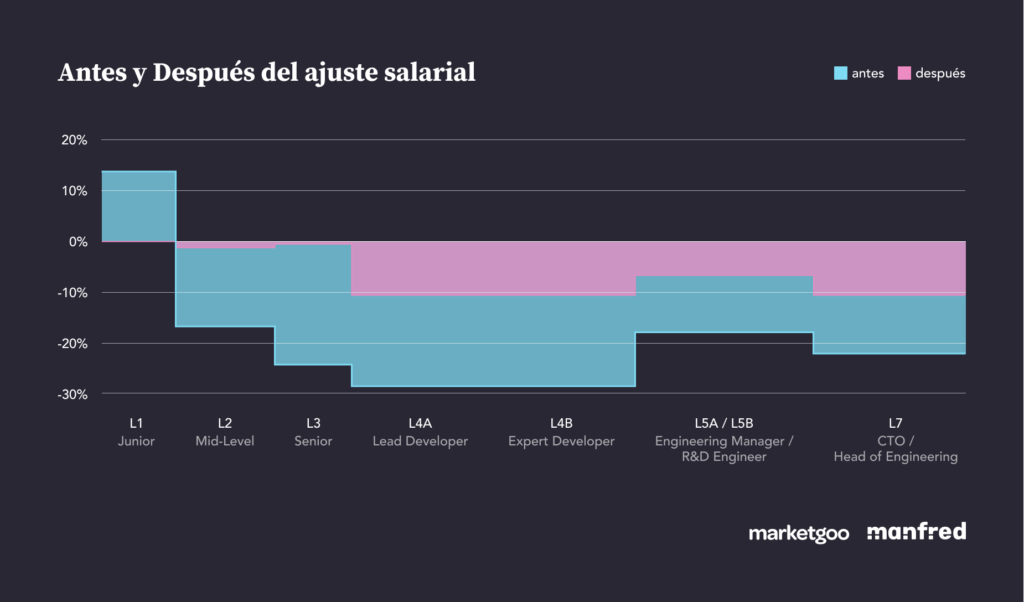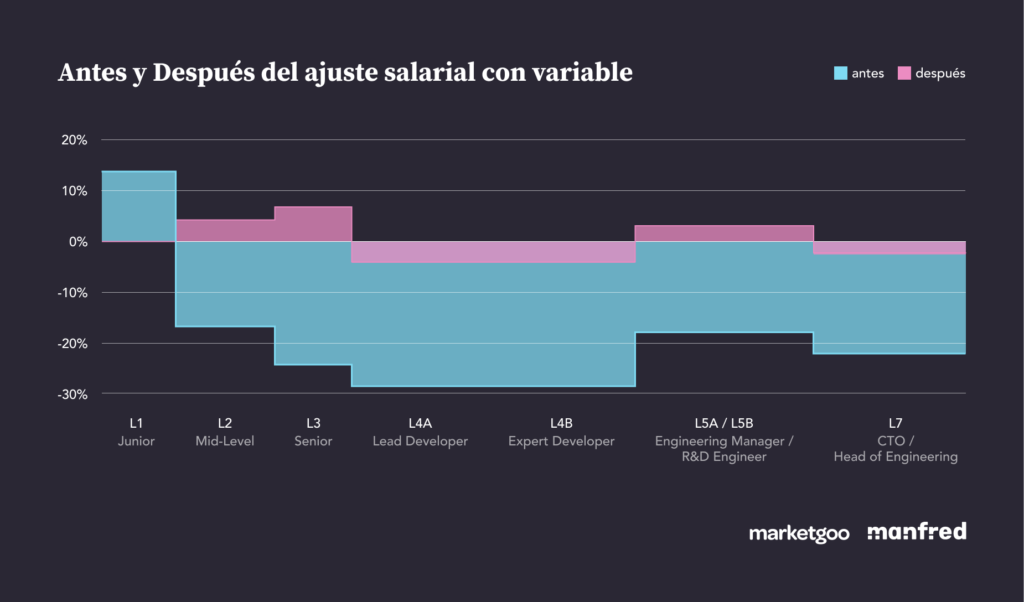How marketgoo's technical team matched their salaries to the market

tl;dr
marketgoo's engineering team recently had a general salary increase to keep pace with the market Read on to discover why they started this process and how they did it, and which role has Manfred played along the way.
Background
We have known the marketgoo team for years. Not only because we are contemporary startups in a very small entrepreneurial ecosystem, but they have also been our clients on several occasions. They're nice people who are building cool stuff.
At marketgoo they are very aware that it is increasingly difficult and expensive to hire. It’s a hot industry topic, and one of the main issues that tech teams are facing globally. In this case, they had a head-start: there has been no voluntary turnover in their engineering team for the past 8 years. But they know that the effervescence of the market, together with COVIDgeddon, is the perfect breeding ground for increasingly attractive offers which are difficult to reject, since they include higher salary ranges in addition to the commodified perks: remote working, freedom of schedules, extra days off, etc.
A startup tends to bet on people who will in turn bet on the company in the long term, even if this sometimes means lowering their salary. It’s a critical act of commitment to the project and to the team. After the first few years of tightening their belts as in any bootstrapped startup, marketgoo has been growing well for many years now, with an approximate 40% annual profit.
This year seemed then to be the right time to settle accounts with those who trusted us and go for a critical point in the pillars of EOS Life that mark their culture and that were not being fulfilled: «being compensated appropriately».
How it went down
As it should: guided by data rather than just “anecdata”. Desk research was of course done to understand the current climate in terms of job offers and talent pool that were comparable to the profiles and roles they usually work with. On the other hand, relying on us —specifically on our colleague Leo— to obtain primary data regarding the situation of the market for technical talent.
Another noteworthy action on the part of marketgoo is the transparency with which this was communicated internally. They asked their team about the offers they receive, the salary ranges they are offered and, above all, what they find attractive about those offers. No way to meet the needs of your team if you don’t actually know what those needs are.
The result of that poll? The offers that team members considered compelling did not have substantial improvements beyond salary. It was clear, therefore, that it was a matter of money: the team considered that they could and should have higher salaries given the current market.
It is interesting to point out thatin marketgoo they have a self-proposed salary process available to the entire team Anyone can start it on their own whenever they want if they feel that their compensation needs revision. So why didn’t we resort to this mechanism in the first place? Well..it seemed that our team members were being conservative in their salary ask, so as not to undermine the growth of the company. They were aware that a general salary increase would signify an important financial effort for the company, and preferred to stay on the “safe” side. Somehow, this selflessness and long-term bet from the team was playing against our own interests.
So being very aware as they were of their salaries being less than market rate, they decided to unilaterally launch a salary improvement process, without preventing anyone from starting the salary self-proposal exercise if even after this general raise they felt unsatisfied.
Looking at the Numbers

As it can be observed in this comparison, marketgoo's salary ranges were lagging behind the market, especially in senior roles, which were almost 28% below. With the general adjustment that we applied, these differences have been minimised, as seen in the chart:

As you can see, as we climb up the ladder, a widening gap in the salary ranges becomes evident. This is intentional, as this initiative only affects the fixed component of salaries. There is a part that is variable and that is not contemplated here.
As mentioned before, in marketgoo they always bet on the long term, and that’s why their team members have a variable pay component which is tied to profit sharing. Currently, 15% of profits are distributed every 6 months among all members who have been with the company for more than 2 years. This 2-year vesting period is virtually impossible to apply to someone joining as a junior, as after 2 years they are unlikely to remain a junior in marketgoo. That is the reason why in the initial sections of the ladder the salary ranges are more adjusted to the market, but in the higher ones, which receive more variable weight, there are more differences.
During the last profit sharing round, senior roles got around 5000€ (on a bi-annual basis), while R&D profiles reached 8.000€, totalling about €16k per year.
If we add the variable amount to the equation, we can see that the chart changes considerably:

With the new salary ranges and profit sharing, the entire team is within -4% and +6% of the market rates. Let’s go over the direct financial impact this initiative had on the team.
Impact on the Team
The main objective here was to improve the team’s conditions. For example, a senior role that earned €40K would now go up to €50K. In addition, in some cases we offered higher increases due to the impact that some members had been contributing to the company for a long time.
This is the average raise at each level:
- L1: +7,14%
- L2: +18,95%
- L3: +21,5%
- L4: +14%
- L5: +8,33%
- L7: +16,67%
In addition to the general increase, there are other promotions in the works: 4 people between October of this year and January of next year will increase their base salary by 10%, two of them will be joining the profit sharing program, increasing it by another 10%. Others will be promoted in January 2023.
Impact on the Company
The most direct impact is the increase in personnel expenses, around +14% due to the salary increase.
The indirect impact is more distributed:
- On the one hand, profit sharing has been reduced by around 9%. This is understandable: if personnel costs are increased, profit is reduced. This decrease is small compared to the improvement in wages.
- On the other hand, it means long-term savings. Hiring is difficult, and even though it is easier with us (;-)), it is still a considerable investment o time and money. It is estimated that each employee retained saves more than €20K in expenses and time spent hiring a replacement and re-onboarding from scratch. So in the end, they would have to pay the new hire the same as if we had increased compensation and retained someone who was already on the team.
Deep Trust and Ownership
Many of us are used to hearing advice that the safest way to get a salary bump is to switch companies. In fact, there are articles that say that the maximum salary increase you can receive in your current company will be around 4%, but if you change jobs, this percentage will be closer to 5.3-11%. However, we are confident that there are places where they are working to change this mindset. At marketgoo, for example, it has been shown that giving employees the opportunity to talk directly about their salaries in dedicated spaces can have an even greater impact on them. So simple and hard as it gets generating an environment of trust and freedom.
It is a win-win approach. The team members appreciated the initiative and those who may have considered moving on for financial reasons have ruled out that option. The managers, for their part, are calmer with the team being well compensated and knowing that marketgoo will carry on making efforts so that the team continues to develop and grow.
Happy ending, the kind that we like. Because if there's one thing we love what we do, it's stories like this one.


